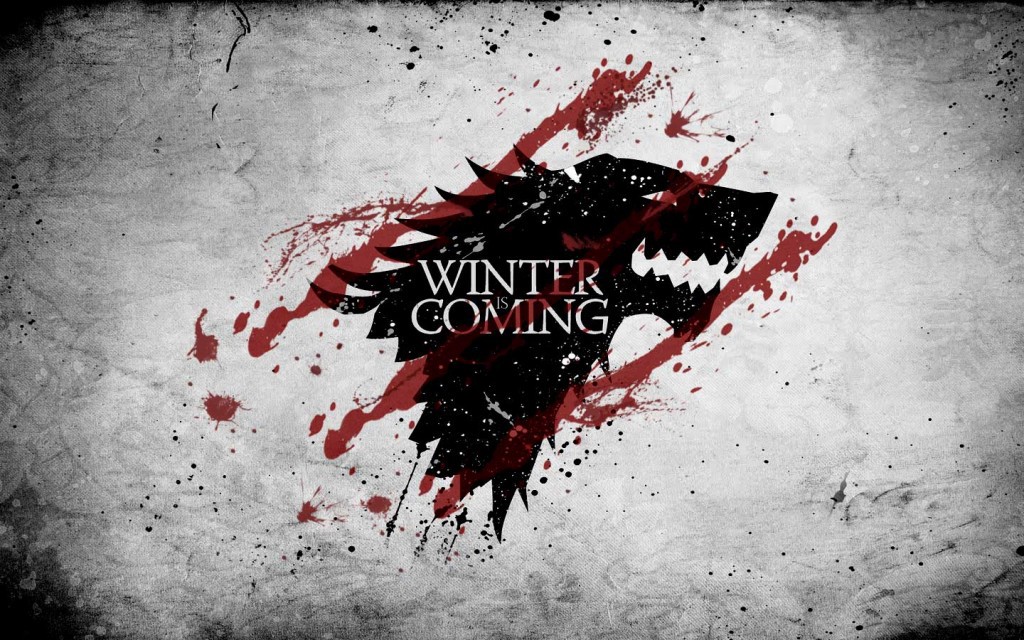A Game of Thrones and the Rise of Fantasy
I wasn’t going to do it. Truly, I wasn’t. But the HBO series is so good, I had to get into the novels, too.
I have not read epic fantasy in at least twenty years, yet it was pretty much all I read in high school. Yes, I’m well versed in the classics: Tolkien’s The Lord of the Rings, Brooks’ Shannara series, Moorcock’s Eternal Champion multiverse, Howard’s Conan novels and stories, Donaldson’s Chronicles of Thomas Covenant and Mordant’s Need, Leiber’s Fafhrd and the Gray Mouser, Feist’s Riftwar Saga, Aspirin’s Myth Adventures, and others. No this list is not exhaustive, but these were the biggies in the eighties. And really, I read all of them. My transition to science fiction was probably through Herbert’s Dune series, and after devouring that, I never really went back to fantasy.
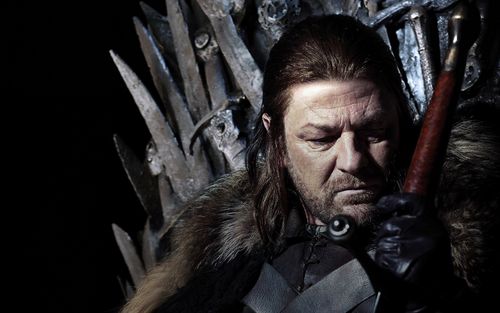
I successfully resisted Harry Potter. That one was easy: it was a series for kids, right? In fact, it seems in many ways, fantasy appeals to children more than adults—I know I liked Star Wars much more as a child than I ever did as an adult. In fact, its whole worldview is simplistic and pretty silly. I know these are gross generalizations, and one of which I’m about to contradict. However, it seemed to me that at the height of the Harry Potter craze, the Potterheads (or whatever the fans are called) were mainly high-school and college girls.[1] (OK, I’m going to stop this line of thought right here.)
So when a colleague gave me George R.R. Martin’s A Game of Thrones—the first tome in A Song of Ice and Fire Series—I just laughed. It’s not that I didn’t enjoy the first two seasons of HBO’s excellent adaptation—it’s just, well, science fiction is my thing now. Besides, I just didn’t have time to read a who-knows-how-many-books epic fantasy series. I guess after watching the third season of A Games of Thrones, I decided to do it. Something struck a chord. Now I’m in a race against HBO: I have to finish the series before the next season premieres, probably in the spring of 2014.[2]
I wonder just what it is about fantasy that speaks to our current culture—I guess it’s gone on for years, perhaps since the release of The Fellowship of the Ring and Harry Potter and the Sorcerer’s Stone—both in 2001. Or maybe earlier, to the release of Martin’s A Game of Thrones in 1996 or Rowling’s Harry Potter and the Philosopher’s Stone in 1997? While I wouldn’t want to underplay the popularity of the books, I would bet it’s the films that brought epic fantasy into the contemporary cultural consciousness in 2001. I remember asking a student in my popular culture class in 2009 after her presentation on Harry Potter just what it is about fantasy in general and Harry Potter in particular that speaks to her. She said something truly insightful about coolness of the magic and the escape from reality, but surely there’s something more to it? Could one reason be special effects: we now have the technology to do these stories justice on the big screen? Maybe. However, unlike the fantasy series I read as a child, these new series written around the turn of the millennium are, in a word, dark. A Game of Thrones especially seems to epitomize the insecurities of our world after September 11, 2001. Yes, the novel was written before, but it only became a best seller in 2011—after the premiere of the HBO franchise.
If you have not read the series, expect spoilers from this point forward.
Yes, it’s dark (stark?). And unpredictable. It also borrows from humanity’s heroic literature of the past: the epic. These heroic poems come from national literary traditions and are usually composed of many stories that tell the tales of a nation’s infancy when it had to struggle for survival. These are the times when a nation needs its heroes: great men (often supported by women) performing great deeds to lift their people out of the wilderness and into civilization. Great names are associated with the epics: Achilles, Odysseus, Gilgamesh, Aeneas, Beowulf are remembered for their great feats in battle (Achilles), or their cunning wiles (Odysseus), or their duty to their people (Aeneas), or their epic quests (Gilgamesh), or their commitment and fidelity to their brothers (Beowulf). All were great warriors and donated something to our conceptions of ourselves as human beings, however flawed.
To me, this is what Martin picks up in A Game of Thrones. The novel has a great story and uses many epic conventions: like the arming of the hero, the catalogs of warriors, the expansive scope, the great journeys, the brutality or war. Yet, Martin’s novel is character-driven above all. Unlike the epic, GoT does not have one central hero, but each chapter uses a limited omniscient narrator where the events are told from a particular character’s point of view. These characters seem to be the heroes, or at least the protagonists: Eddard, Catelyn, Jon, Sansa, Arya, Bran, Daenerys, and Tyrion. All of these, except two, are Starks, with Daenerys representing the Targaryans and Tyrion Lannister, well, standing up for himself. He even throws in some zombies.
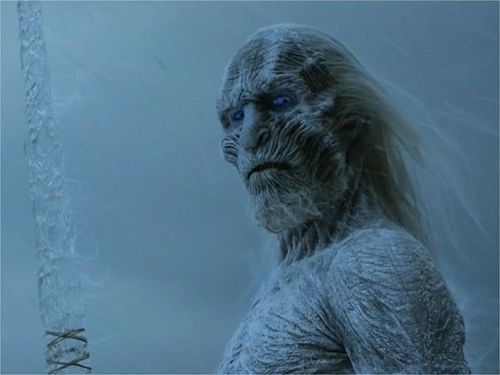
The prologue sets up the theme of uncertainty, as if something very wrong is about to descend on the Seven Kingdoms. As it turns out, this becomes just a set-up for what will presumably be a much larger story arch that will develop throughout the series. It’s a threat from beyond — something otherworldly that will endanger the whole world no matter one’s allegiances, families, or petty games of thrones. Zombies are always good for bringing humans together. We’ll see.
Aside from the foreboding of the prologue, the seven kingdoms are currently at peace, under the reign of Robert Baratheon. As any student of the Odyssey can tell you, peacetime can be even more dangerous than war. It takes a different sort of hero to negotiate political systems as an aristoi. It seems to me that Eddard Stark represents the old guard: the faithful and loyal soldier who carried out his duty to his king with honor and solemnity. His demeanor is formal and his resolve is straightforward: he is not one to play games. Ned was content to live the rest of his days as the Warden of the North, surrounded by his family and serfs. However, its Robert Baratheon, also a member of the older generation, who calls Ned back into service as his Hand. It’s pretty clear to Ned that this won’t be good.
While we might be tempted to place Ned in the role of the hero—they certainly did in the HBO series when the cast Sean Bean in the role—I’m not so sure the novel encourages us to do so. It seems to me that Martin’s narrative favors the underdog, not the most powerful. It’s true that more chapters are told from Eddard’s pov than any of the other characters, but all of the other chapters’ are from women, children, bastards, or Imps—as if Martin has, in the words of Tyrion Lannister, “a tender spot in [his] heart for cripples and bastards and broken things.” These, it seems, are the new heroes, representatives of the new world order that could be on the rise. Their rise, however, is met with dark and numerous obstacles.
Perhaps this is why Eddard has to die at the end of the novel. His death is a reluctant sacrifice to his children, even though there’s no real reason to interpret it this way. The new juvenile king Joffrey’s order is capricious, and Ned’s death seems to be more about its shock value than thematically driven. Robert’s death presages Eddard’s, so with hindsight at least, it should really come as no surprise.
For example, Eddard is no Odysseus. When Odysseus lands on Ithaca in book 13, he spends the next seven books in disguise, determining just who he can trust and who is his enemy. Odysseus is not direct: in fact, when he does say his true name is when he gets in the most trouble. Ned is still the soldier, and he is gruff and always direct, even though the Machiavellians Littlefinger and Varys do their best to warn him. Perhaps the decisive moment is when he figures out why John Arryn was killed, and he confronts Cersei about it. Ned gives her an ultimatum, thinking he can win, but what he really betrays are his cards, giving her what she needs to defeat him. Ned learns that times of peace can be more dangerous than war, but its a lesson learned too late to save him. At least when someone pulls his sword and charges at you, you’re pretty sure of his intentions. Ned gets none of this from the court at King’s Landing. He is not equipped to survive this battlefield.
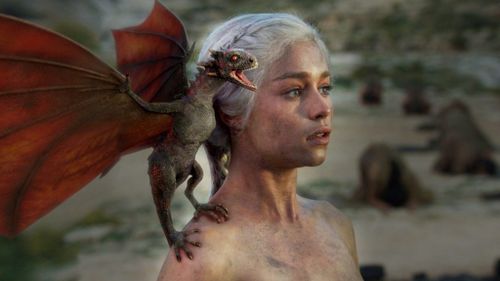
Compare Eddard to Daenerys Targaryen, perhaps the true survivor of A Games of Thrones. Granted, Dany is in a different land and fighting a different sort of battle, but she manages to grow from a oppressed girl in a formidable leader. She, like Odysseus, is more of a chameleon, able to adapt to her surroundings and play her part in order to get ahead. Her brother Viserys, like Eddard, is a remnant of the past who just needed to die. And, boy, did he. In the same way, Drogo, Dany’s Dothraki husband, eventually has to be removed for her to see her true potential. (What is it about these pig-headed patriarchs?) By the novel’s end, she has been reborn through fire, gaining three baby dragons to show for her trials. She’s not queen yet, but she has proven her ability to adapt and survive.
Similarly, Sansa and Arya, too, show their ability to adapt, particularly the latter. Sansa must overcome her romantic notions about knights and ladies in order to survive King’s Landing and her uncertain place as political prisoner in Joffrey’s court. Sansa is a proper lady, and is therefore at a disadvantage. She will have to learn to dissemble quickly if she wants to survive. Arya, on the other hand, has never wanted to play this role; instead, she wants to be a water dancer to take care of herself. She is able to elude capture, and with the help of Yoren, she manages to escape King’s Landing at the end of the novel though she has a difficult road ahead.
Of Ned’s four sons—Robb, Jon, Bran, and Rickon—only the middle two are featured in the pov chapters. Robb, Ned’s direct heir, is his father’s son. He commands the allegiance of his lords and shows himself to be a capable leader, yet his thoughts are not featured except through his interactions primarily in the Catelyn chapters. While Robb appears to be a major force by the end of the novel as the “King of the North,” he might be too much like his father to last in this new world.
Jon’s narrative is an interesting one. He is an outsider is several respects, probably most obviously as Eddard’s bastard. He is not a Stark, but a Snow, a generic surname for bastards born in the north. He is raised at Winterfell, but even there is marginalized by protocol and the feelings of Catelyn toward him. When Eddard is summoned south, Jon follows his uncle Benjen north to take the black—to leave his past behind and swear loyalty to the Night’s Watch. Jon might be a Telemachus figure: the son in search of a father. Not only does he lose Ned, but his uncle Benjen disappears soon after their return to the wall. He receives advice from the elderly Maester Aemon and becomes the squire of Jeor Mormont, the Lord Commander of the Night’s Watch. While Jon inherits his father’s sense of duty and loyalty, he is also not a Stark. He must find his own path.
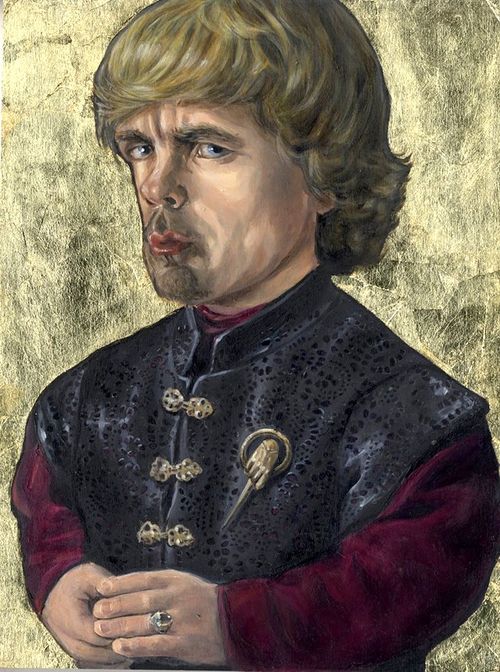
Perhaps the most interesting character in this novel is Tyrion Lannister, the Imp. He is the most playful character, and he links several story lines. He is a Lannister, but he really doesn’t fit in. His relationships with his father and siblings are contentious, and while he has a loyalty to his family, he understands their flaws. He enjoys the Lannister name and the respect it earns him (most of the time), but he sets himself apart. He is curious about the world and its people; he is interested in developing his mind — a necessity his physical dimensions seem to precipitate. At one point while traveling north to see the great wall, Jon asks him, “Why do you read so much?” Tyrion replies, “Look at me and tell me what you see.”
My legs are short and twisted, and I walk with difficulty. [. . .] My arms are strong enough, but again, too short. I will never make a swordsman. [. . .] Alas, I was born a Lannister of Casterly Rock, and the grotesqueries are all the poorer. Things are expected of me. My father was the Hand of the King for twenty years. My brother later killed that very same king, as it turns out, but life is full of these little ironies. My sister married the new king and my repulsive nephew will be king after him. I must do my part for the honor of my House, wouldn’t you agree? Yet how? Well, my legs may be too small for my body, but my head is too large, although I prefer to think it is just large enough for my mind. I have a realistic grasp of my own strengths and weaknesses. My mind is my weapon. My brother has his sword, King Robert has his warhammer, and I have my mind … and a mind needs books as a sword needs a whetstone, if it is to keep its edge.
Tyrion is clever, but he often finds himself in bad situations. He is snarky and sarcastic, and he is willing to take chances. He tries to see the world as it is, embracing his physical reality so it can never be used against him. He hangs out with sellswords and whores, and maintains a confidence even in the presence of his domineering father and his ruthless sister. Perhaps the new hero of the post-9/11 epic fantasy is this unlikely character. Still, his major conflict will come when he has to truly decide his loyalties.
OK, this entry is turning pretty epic on its own. Yet, I have a couple more thoughts. I wonder is Cersei Lannister is supposed to have some relationship to the Odyssey’s Circe? Jamie Lannister is not well developed in this novel, and his major contributions are killing the former king, boinking Cersei (his sister), throwing Bran off a tower, and attacking Eddard and his men in King’s Landing. A solid résumé for a villain. Speaking of just evil: Joffrey turns out to be quite the psycho. Here’s hoping he gets his.
I know I didn’t really talk about Bran nor Catelyn, but they’re likely to play larger roles in the next book. More on them later.
After all that, I’m glad I picked up A Game of Thrones. Martin’s fantasy is truly epic in scope, but his writing is deft and masterful: he almost makes it look easy. My goal is to get caught up with all the current books before HBO’s next season. As I finish this entry, I’ve nearly completed A Clash of Kings, so that will likely be my next entry.
notes
- ↑ For more see: Sragow, Michael (July 18, 2011). "The secret to Harry Potter's success". The Baltimore Sun. Retrieved 2020-01-01.
- ↑ I didn’t know at this point that Martin had not even finished it, nor do I think he ever will. Maybe it’s not necessary now, Jan 1, 2020, that the series has ended.

